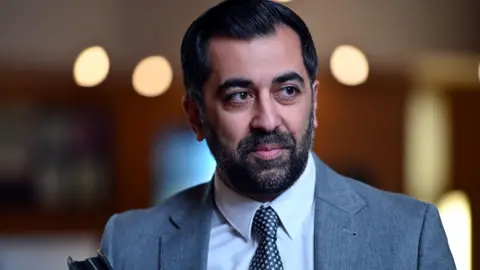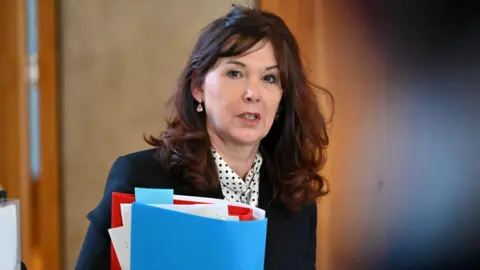Former Scottish first minister urges exemption for peaceful Palestine Action supporters from prosecution
Humza Yousaf tells Scotland's top law officer it is not in the public interest to prosecute non-violent expressions of support for proscribed group
Humza Yousaf, Scotland's former first minister, has called on the country's top law officer to exempt peaceful protesters who express support for the recently proscribed group Palestine Action from prosecution, saying it would not be in the public interest to pursue non-violent individuals.
Palestine Action was designated a proscribed terrorist organisation last month after members broke into RAF Brize Norton in Oxfordshire and caused an estimated ��������������7 million of damage to aircraft. In comments to BBC Scotland News, Yousaf argued that those who supported the group's aims but did not engage in criminality should not face prosecution under the proscription.

"Humza Yousaf, former first minister"
The Crown Office and Procurator Fiscal Service (COPFS) said the Lord Advocate, Dorothy Bain KC, had made a statement reaffirming support for protest within legal boundaries. COPFS is responsible for criminal prosecutions in Scotland and has emphasised that the right to lawful protest remains protected even as it enforces laws against criminal acts.
The Home Office declined to provide a statement to BBC Scotland News but pointed to comments by Home Secretary Yvette Cooper in a national newspaper. Cooper said: "In a democracy, lawful protest is a fundamental right but violent criminality is not," and criticised Palestine Action's actions while distinguishing lawful demonstration from criminal activity.

"RAF Brize Norton"
The government's proscription of Palestine Action has heightened debate over how the law should treat those who express support for a banned organisation without participating in violent or illegal acts. Authorities have already made arrests in related contexts: in July, a man was detained outside the TRNSMT music festival in Glasgow for wearing a T-shirt reading "Genocide in Palestine Time to Take Action."
Yousaf's intervention centres on prosecutorial discretion and the public interest test prosecutors use when deciding whether to bring charges. He urged the Lord Advocate to apply that discretion to avoid criminalising peaceful expression tied to an organisation that has been proscribed because of the actions of some of its members.
COPFS did not indicate any immediate change to charging policy in response to Yousaf's call. The statement from the Lord Advocate reiterated the office's commitment to uphold the law while protecting legitimate protest, and said decisions on cases would continue to be made on evidence and legal criteria.
The issue highlights an ongoing tension in the United Kingdom between protecting the right to peaceful protest and responding to direct, and at times costly, criminal acts carried out in the name of political causes. Officials in Scotland and at the UK level have emphasised both the importance of lawful dissent and the need to deter and prosecute violent criminality.
Any formal change or guidance on prosecuting expressions of support for Palestine Action would come from the Lord Advocate and COPFS. Police and prosecutors in Scotland have said they will continue to consider each case on its facts and in line with prosecutorial guidance.